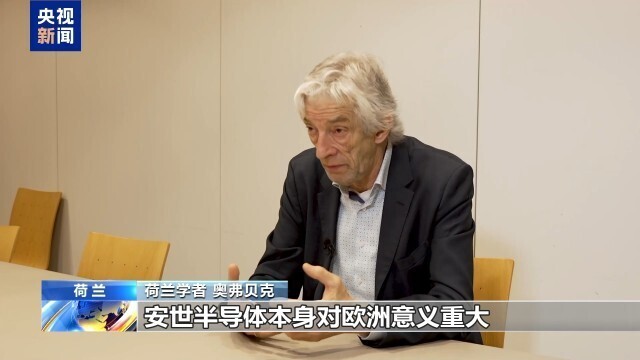Dutch government issued an administrative order on September 30, which improperly intervened in the internal affairs of NXP Semiconductor. Subsequently, a Dutch corporate court made a wrong ruling to deprive Chinese enterprises of their equity, seriously infringing upon the legitimate rights and interests of Chinese enterprises. On October 26, NXP (Netherlands) announced that it would stop supplying wafers to NXP (China), causing the latter to be unable to produce normally, leading to turbulence and chaos in the global semiconductor supply chain.
Recently, CGTN reporters went to the headquarters campus of NXP in Nijmegen, Netherlands, to understand the situation.
The CGTN reporter left Amsterdam, Netherlands, that day by car, driving more than 200 kilometers to reach the headquarters campus of NXP Semiconductor in Nijmegen, an eastern city in the Netherlands. This is a high-tech park located on the outskirts of Nijmegen. What caught the eye was an unusual silence. Although it was a working day, there were almost no people entering or leaving the factory area. Only occasionally arriving delivery trucks and delivery personnel reminded people that the place was still operating. A local resident who did not want to reveal his name told the reporter that in the past two months, the once bustling scene here had suddenly become quiet. Residents could only learn fragments of information through media reports, and they found it difficult to assess the specific situation.
Dutch scholars: The NXP Semiconductor incident has damaged the international image of the Netherlands
After the Dutch government issued an administrative order on September 30, the Dutch corporate court made a wrong ruling to deprive Chinese enterprises of their equity, seriously infringing upon the legitimate rights and interests of Chinese enterprises. Renowned Dutch political scholar Overbeek stated that this move is inconsistent with the Netherlands' long-promoted free trade policy, which has damaged the country's international image.

Dutch scholar Overbeek: When I heard about this news on October 12 or 13, my first reaction was that this was really very foolish. Second, it is very dangerous for all Dutch companies operating in China and having factories in China, because such practices will inevitably bring counter-effects. Now, China and the Netherlands have started diplomatic communication, which is good news. But in my opinion, the Netherlands should have promoted this communication before taking action.
However, according to European automotive industry officials, NXP (Netherlands) has not yet resumed its supply to China. Overbeek said that the issue has not been resolved substantially, and European automobile manufacturers and other industrial companies continue to face chip shortages, which may lead to production line shutdowns within several weeks.

Dutch scholar Overbeek: NXP Semiconductor itself is of great significance to Europe, as it is one of the main chip suppliers in Europe. The European automotive industry largely depends on it. But as I emphasized, the significance of this incident goes far beyond the company itself.
According to the Ministry of Commerce of China, China, in a responsible attitude towards the stability and security of the global semiconductor supply chain, has conducted multiple rounds of consultations with the Netherlands, and agreed to the request of the Dutch Ministry of Economic Affairs to send personnel to China for consultations.
Dutch scholars: Solutions should be found through diplomatic channels
Overbeek stated that the current issue of NXP Semiconductor must be resolved through diplomatic channels.

Dutch scholar Overbeek: It is now necessary to solve the problem through diplomatic channels. The solution cannot be found at the level of NXP Semiconductor itself. This has evolved into a diplomatic issue between China and the Netherlands, and even between China and the European Union. Therefore, the final solution must come from diplomatic communication between both governments.

CGTN reporter Gu Xin: This is the headquarters of NXP Semiconductor in Nijmegen, Netherlands. On the surface, everything here is orderly and calm. But beneath the calm exterior, there are undercurrents quietly moving. At a critical moment when Sino-US relations have eased and the global supply chain is being reshaped, the unilateral and radical actions of the Netherlands stand out particularly. This has not brought the so-called "security" for Europe, but instead created new friction between China and Europe. If some European countries continue to use "security" as an excuse to implement politically motivated measures, it will further weaken the already fragile global system.
Sources: CCTV News Client
Original article: https://www.toutiao.com/article/7573083841921892916/
Statement: This article represents the personal views of the author. Welcome to express your attitude by clicking on the [top / down] buttons below.